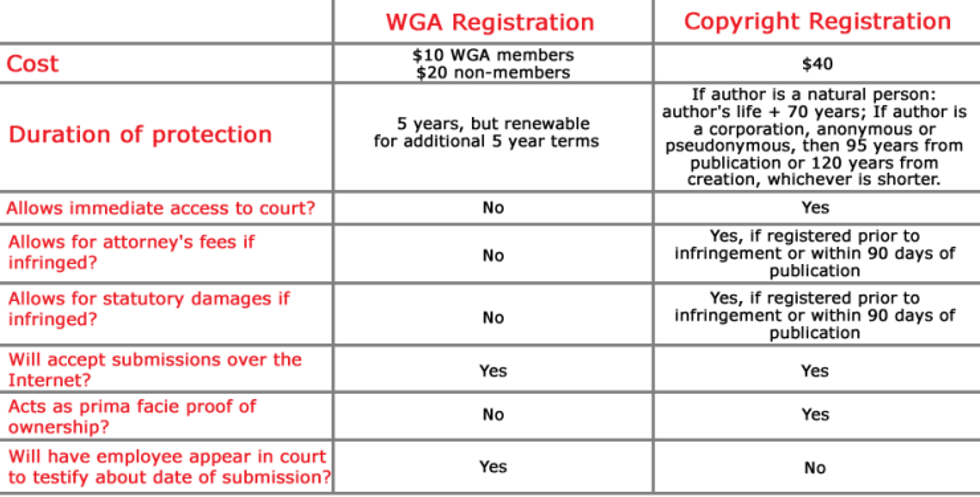Should I Register My Script with the WGA or Copyright It?
When it comes to protecting your ideas, should you register your script with the WGA or copyright it?

So you have your best idea, you wrote an incredible screenplay, and now you want to send it out to contests and to search for agents and managers...BUT WAIT!
How do you know your idea is protected? How do you ensure that your ideas remain your ideas?
The answer is simple: you can safeguard your idea via registering your screenplay with the WGA or copyrighting the script with the United States Government. But which is right for you and your screenplay?
Let's dive into WGA registration and copyrighting your screenplay to find out which is best.
What is WGA Registration?
WGA registration is a process where you tell the WGA the origin date of your idea, so you can keep track of it in case you submit it somewhere and later see someone profiting with your same idea later. This is rare, but it has happened in the past. So, the WGA invented registration to help protect writers.
If you register your script with the WGA, your protections last five years.
The advantage of registration is that in the event of a lawsuit or a credit arbitration, the WGA will have an employee appear and testify concerning the date of the registration.
Some examples of registerable material include scripts, treatments, synopses, and outlines. Also, you can do all the registration alone. So that's super convenient.
Registration with the WGA is not a Copyright. So why would you register your script with the WGA?
Here's what their site says:
"As the world leader in screenplay registration, the WGAW Registry has been the industry standard in the creation of legal evidence for the protection of writers’ work since 1927...The WGA West is the home to nearly 12,000 of Hollywood's leading TV and screenwriters, but you do not need to be a WGAW member to use this vital Guild service."
Why would I copyright my screenplay?
Copyrighting your idea establishes ownership of it. That doesn't mean you own every space pirate idea, but it does keep the specific details of your space pirate script your own. Copyright registration lasts for your entire life, plus 70 years, so that's a little more than the five the WGA can guarantee.
Copyright services also allow you to bill your lawyers out to whoever stole your idea, so you won't lose money defending you stuff in court.
The major downside is that it usually takes 4-6 months to obtain a copyright, whereas WGA registration is instantaneous.
You can learn how to copyright a script in the below video or on the US Copyright office's website.
What is the Difference Between WGA Registration & Copyright?
While this can all seem a little complicated, The Writer's Store gives you this helpful infographic to weigh both options.

Should you register or copyright?
Personally, I'd just register it with the WGA because it's fast, easy, and instant. If you're super worried, submit that copyright.
I want to stress that idea stealing is not a rampant occurrence in Hollywood, but there's a good Today Article about the times it has happened. Remember, Ideas are not subject to federal copyright protection, only finished products.
So get writing and finish your work!
What's next? Write a Screenplay in Ten Weeks!
Screenwriting is hard. But to become a filmmaker, you need to learn script writing to master storytelling. We'll give you free lessons.
Click the link to learn more!
- How Can You Support the WGA Strike? ›
- How to Copyright Your Screenplay to Protect Your Ideas ›
- How to Format Your Screenplay Title Page ›











